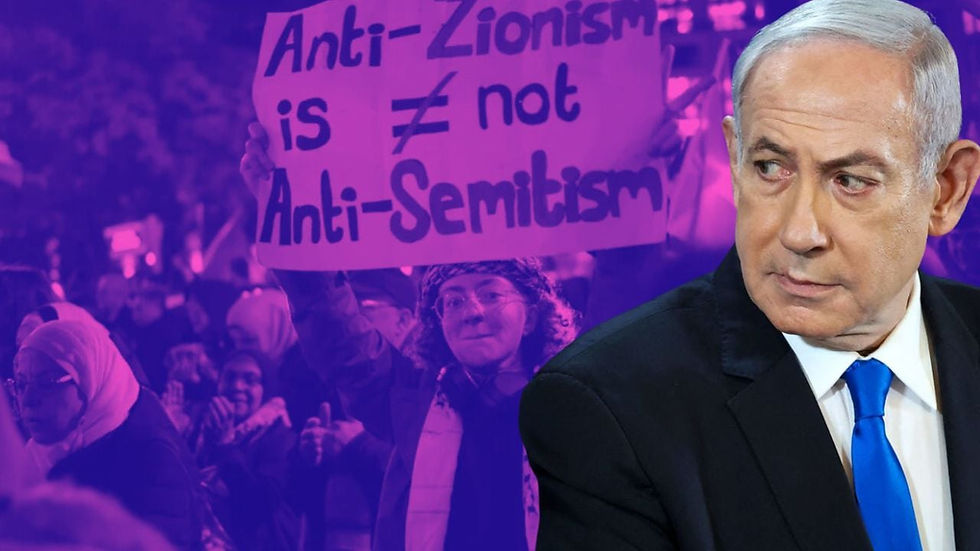- Aug 4, 2025
- 8 min read

Redefining “Antisemitism” To Mean Anti-Zionism Is Endangering Jews
August 4, 2025
Classical liberalism faces unprecedented challenges today, threatened by authoritarian ideologies from both the Left and the Right. These ideologies, often labeled as identity politics, manifest in various forms such as intersectionalism on the Left and ethnonationalism on the Right. My career has been dedicated to defending classical liberalism—particularly its libertarian variant—against these threats. Over the past decade, I produced dozens of videos and films advocating for principled individualism, and collaborated with numerous prominent figures in the anti-identity politics movement while working at the Foundation Against Intolerance & Racism.
However, recent events, particularly following October 7th, have exposed a troubling hypocrisy among many of my former colleagues. While we once united under principles of treating everyone equally and applying the same rules universally, their embrace of Zionism—an ethnonationalist ideology—starkly contradicts these principles.
This has become painfully clear to me post-October 7th. I was raised as an Orthodox Jew (of the Modern Orthodox variety) and sent to private Jewish schools K-12 where instilling Zionism into students’ identities was an explicit part of the mission. Despite being fully American, I was raised celebrating Israeli holidays, taught modern Israeli Hebrew, took classes in Israeli history (or at least a certain perspective on it), and spent my final semester of high school touring around Israel, a trip which included a week where we participated in a replication of the IDF’s basic training and culminated in many of my classmates’ first time shooting a gun—an IDF standard issue M16. (To see what this life is like for young Jewish-Americans, see the recent film Israelism). The indoctrination worked for almost all of my classmates, a number of them even joined the IDF after graduating; meanwhile, none joined the American military.
I was different, however. I’m not entirely sure why—some have suggested to me I may be mildly autistic—but I have a need for logical consistency; its absence gnaws at me, and I find it difficult to let it go. As such, my libertarianism, atheism, and anti-Zionism developed in tandem. Classical liberal philosophy is rooted in “life, liberty, and property,” and a consistent application of property rights is core to the libertarian tradition. European Zionists coming to a land overwhelmingly owned by Palestinian Arabs (Zionists purchased only 6.6% by 1948) with the intention of forming an ethnostate for themselves, accomplishing this goal by expelling 750,000 Palestinians—many of whom owned their homes and continue to pass down their keys and property deeds to their children and grandchildren—and refusing them the right to return to their property for over 75 years (sometimes shooting unarmed civilians at the border to prevent it), is blatantly inconsistent with any reasonable interpretation of classical liberalism.
Last year, I published my first book, Redefining Racism: How Racism Became “Power + Prejudice.” The book tells the story of Leftist activists’ decades-long attempt to redefine the word “racism” away from its traditional definition of “prejudice or discrimination based on race” to “Power + Prejudice,” meaning any bigoted actions against a group with alleged institutional power—namely white people—cannot be called “racist.” The activists who developed and forwarded this redefinition were all themselves white, and while the story I uncovered reveals egregious behavior on their part, I recognize that they undertook their activism from a core of good intentions. They aimed to focus attention on the bigger racial problem, white racism, and so sought to remove any discussion of minorities’ bigotry. But by making the standard for racism unequal in application, I track how their redefinition backfired, creating far more racism than it solved.
Recently I attended a meeting of conservative activists to promote my book. I explained my research to a room that nodded along in agreement and ended to applause; I even sold a few copies in the room. But I was not the only activist presenting that day. Another activist told the room about his project, a push to get the Senate to legally instantiate the International Holocaust Remembrance Alliance’s “working definition of antisemitism.” He too received impassioned agreement from the crowd. As someone who needs consistency, you can imagine my frustration.
For readers unfamiliar with the IHRA’s redefinition of antisemitism, it’s the product of a 2016 meeting of the alliance’s 35 member nations (including the United States and Israel). It reads, “Antisemitism is a certain perception of Jews, which may be expressed as hatred toward Jews. Rhetorical and physical manifestations of antisemitism are directed toward Jewish or non-Jewish individuals and/or their property, toward Jewish community institutions and religious facilities.” The empty vagueness of “certain perception” makes the redefinition impossible to interpret on its own, so the definition was accompanied by 11 examples to clarify it. Seven of those examples make reference to Israel, including, “denying the Jewish people their right to self-determination, e.g., by claiming that the existence of a State of Israel is a racist endeavor” and “drawing comparisons of contemporary Israeli policy to that of the Nazis.”
Redefining “antisemitism” to include criticism of a foreign state is far removed from what most people think of when they hear the word. Dictionary.com defines “antisemitism” as “discrimination against or prejudice or hostility toward Jews.” Merriam-Webster as “hostility toward or discrimination against Jews as a religious, ethnic, or racial group.” The Oxford English Dictionary as “prejudice, hostility, or discrimination towards Jewish people on religious, cultural, or ethnic grounds.” Worse, many of the examples given by the IHRA are true. There are numerous points of accurate comparison between Israeli and Nazi policy, as has been repeatedly pointed out by Jewish Holocaust survivors. Founding an ethnostate on shared land with unequal rights for obtaining citizenship, immigration, land ownership, and more is a racist endeavor by either the classic or activist definition. Other examples from the IHRA list refer to Jewish people, but can also be true, such as “accusing Jewish citizens of being more loyal to Israel, or to the alleged priorities of Jews worldwide, than to the interests of their own nations.” I don’t mean to claim that all or most Jews are more loyal to Israel than their own nations, but certainly a substantial volume are. Must I pretend I didn’t watch my Jewish-American classmates join the IDF rather than the American military? It’s not prejudiced to acknowledge this, it’s an accurate judgment based on fact.
Efforts to redefine language for activist purposes extend beyond the IHRA’s redefinition of antisemitism. Deborah Lipstadt, a historian and the former U.S. Special Envoy for Monitoring and Combating Antisemitism, successfully campaigned for the New York Times to alter its style guide to spell “antisemitism” without a hyphen. Lipstadt argued that the hyphen and capital “S” in “anti-Semitism” implied a racial category of “Semite,” which she sought to avoid. While I personally have no objection to this change and adopt it myself—recognizing that the term has long referred specifically to prejudice against Jews—it’s noteworthy that this move effectively deracializes Jews in language.
Contrast this with another style guide change supported by The New York Times’ Nikole Hannah-Jones, the controversial journalist best known for her work on the 1619 Project. The Times now capitalizes the “B” in “Black,” even retroactively in historical quotes, thereby racializing Black identity. Conservatives have rightly criticized this as treating Blackness as a pseudoscientific racial category rather than a mere pigmentation. However, the push to legally enforce the IHRA’s redefinition of antisemitism, which Lipstadt supports, is far more concerning. It seeks to use the force of law to redefine a term in a way that could stifle legitimate criticism and debate, a move that is antithetical to free speech and classical liberal principles.
When first adopted by the IHRA’s 35 member nations, the redefinition was specified as “not-legally binding,” but that’s slowly been changing. In 2020, the Trump administration issued an “Executive Order on Combating Anti-Semitism” which instructed executive agencies to consider the IHRA redefinition when enforcing Title VI of the Civil Rights Act. Then in 2024, the House of Representatives passed the “Antisemitism Awareness Act” by a whopping 320-91 vote, which, if my conservative colleague’s efforts to get the Senate to pass it succeed, would go even further than Trump’s executive order by using the IHRA redefinition exclusively and banning the use of “alternative definitions of antisemitism” for “fail[ing] to identify many of the modern manifestations of antisemitism.” Should the law pass, it will likely be found unconstitutional, but the cultural damage it will cause will be substantial. Additionally, at the state level, 37 states have adopted the IHRA redefinition to varying degrees.
The effort to make antisemitism and anti-Zionism synonymous has already wrought enormous harm for Jews worldwide. As I found when activists tried to redefine “racism,” while much of their target audience went along with it unaware of the bait-and-switch, many went the other way and became racists. This was an entirely predictable result. If one group is allowed to be racist toward another and the recipients of the racism are told that they’re not allowed to call it out, how many of the recipients do you expect will go along with that? If they’re no longer presented with an equal colorblind standard, how many do you expect will independently arrive at colorblind ideology rather than returning racism from whence it came? Similarly, if you’re not allowed to criticize anything that Jews do even when it involves a higher ratio of civilian-to-combatant deaths than the nuclear bombing of Hiroshima, but they’re allowed to call you antisemitic for bringing it up, what do you expect will happen? If they’re not presented with a distinction between Zionists and Jews (ideally with further distinctions between the various sub-types of Zionists and Jews), how many do you expect will identify the distinction on their own? This is the start of a pernicious spiral.
The rise of Nick Fuentes and other actively racist and antisemitic influencers on the growing identitarian-Right is the result of this spiral’s progress. For the first 25 years of my life I never experienced antisemitism once; now I see it multiple times a day on X. I’m not saying such speech should be censored—where it exists it should be brought to light and countered—but we should be alert to its causes. To be clear, racists and antisemites are solely responsible for their actions. But telling someone who doesn’t lock their doors and gets robbed that they should really start locking up isn’t “victim blaming,” it’s a necessary consideration for a responsible person. Here, unfortunately, the Zionists who put Israeli state interests above the well-being of Jews get to decide how to manage the locks for all of us.
Those funding the effort to institute the IHRA redefinition don’t seem to care much about this, they’re all in on helping to enable the most extreme Israeli desires whatever the costs. Research by Eli Clifton, an investigative reporter at the Quincy Institute, has exposed the leading role of the Adelson network in funding initiatives to institute the IHRA redefinition and other policies restricting speech critical of Israel. The late Sheldon Adelson, a casino magnate and ardent Zionist, and his widow Miriam Adelson have poured hundreds of millions into groups like the Maccabee Task Force, where Miriam serves as president, and the Israeli-American Coalition for Action (IACA), which aggressively lobby for the IHRA redefinition’s adoption. For instance, IACA's executive director Joseph Sabag has claimed credit for drafting laws instituting that IHRA redefinition that have passed at the state level. Concurrently, Adelson openly conditioned her massive funding of the 2024 Trump campaign—over $100 million—on support for Israeli annexation of the West Bank, as “God gave the West Bank to the Jews.” Adelson was sued along with a handful of other pro-settler American donors for funneling around $1 billion annually to provide violent West Bank settlers in racially discriminatory Jewish-only settlements with military hardware and arms.
In the woke-era, conservatives have worked to conserve the definitions of all sorts of words the identitarian-Left has sought to redefine. “Racism” is hardly the only example, there’s also “gender,” “woman,” “violence,” “diversity,” “equity,” “inclusion,” and more. Anyone who has taken a position against the redefinition of these words for activist ends, but supports redefining “antisemitism” for an Israeli political agenda, is either a hypocrite or never held a principled position to begin with.
I sincerely hope that my conservative friends will come around to see their inconsistency and change. Unfortunately, their track record leaves me pessimistic. In the meantime, I stand ready to work with anyone anywhere on the political spectrum to defend our ability to communicate accurately and fairly with each other, free of dangerous activist manipulations.












.png)





.png)


.png)
